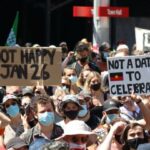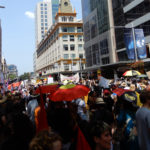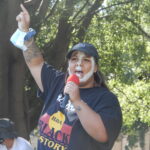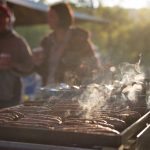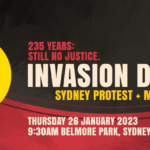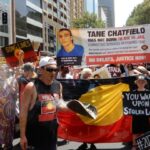March on Invasion Day for First Nations Justice: An Interview With Dunghutti Activist Paul Silva
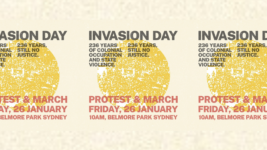
The 12 months since last year’s Invasion Day protest and next week’s have been tumultuous in regard to Indigenous affairs, to say that least. Not only did the government stage an unsuccessful Indigenous Voice referendum, but it’s been supporting genocide upon the Palestinians of Gaza.
The theme of last year’s Invasion Day rally was “Vote No to the Referendum”, as grassroots First Nations activists asserted that the Indigenous voice to parliament that was supposed to provide nonbinding advice on Aboriginal advancement did not spell the way forward for self-determination.
But while more than 60 percent of the nation did vote against it, this was no sweet victory, as the overwhelming majority of the constituency that did, were under the influence of the misinformation campaign run by Dutton and the opposition that posited the Voice as all too powerful.
And in a despicable betrayal of all those First Nations people who stood beside Anthony Albanese in support of the Yes campaign, the PM corrected a journalist on Christmas, explaining that the referendum wasn’t a loss for him, but it was for First Nations people but “they’re used to hardship”.
Perpetuating founding crimes
South Africa charged Israel with genocide at the International Court of Justice last week. And it noted the various forms of genocide, which include killing, causing serious bodily or mental harm, inflicting physically destructive conditions, preventing births or the forcible removal of children.
To charge this country with perpetrating genocide has long been frowned upon, despite many First Nations rights advocates and scholars having laid the claim. Yet, over the last three months, it has become apparent that charging this nation with the crime is better than pointing the finger at Israel.
And the claim that genocide is continuing to take place on this continent is often asserted as well, which involves arguments that place Aboriginal deaths in custody left unpunished as the killing of a specific group to destroy it, in part or in whole, while ongoing forced child removals also fits the bill.
So, to have Albanese herald his victory into office as a win for First Nations, only to drop the ball on the referendum and allow Indigenous peoples to experience that as solely their own loss and then to support the colonial crime of the century, is perhaps not what his election speech foretold.
Still no justice
The government’s Death in Custody website outlines that there have been 558 First Nations deaths in custody since the 1991 Royal Commission. But it neglects to mention that no police or prison officer has ever been convicted over any of these deaths, despite some questionable circumstances.
The footage relating to 26-year-old David Dungay Junior’s death at the hands of Long Bay specialist prison guards is a case in point. And as David’s nephew Dunghutti activist Paul Silva explains, despite this evidence and multiple attempts to reopen the case, NSW authorities are set on denying justice.
Sydney Criminal Lawyers spoke to Paul Silva about the frustration of raising these issues repeatedly with a government that chooses not to hear, the other issues that will be prioritised at next week’s protest and The Blak Caucus, which is a Sydney-based group organising this year’s event.
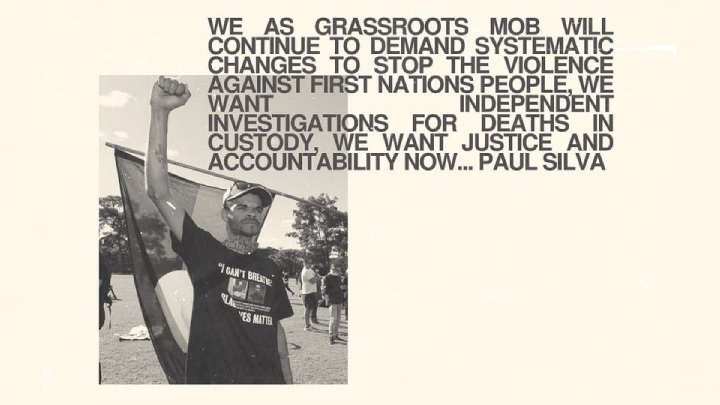
Paul, one of the prominent issues that will be raised next week at Invasion Day protests across the continent is continuing Black Deaths in Custody.
There was a lot of focus on this issue in mid-2020 at the time of the Black Lives Matter demonstrations. So, how would you say this issue stands at present?
We’re in distress. We need immediate action surrounding these events. We need immediate action to hold people criminally accountable, so we can prevent this from continuing.
The statistics from last year show that Indigenous deaths in custody are rising, quite dramatically. It now stands at around 558 Aboriginal deaths in custody since the 1991 Royal Commission.
As a person who has been active on this issue for almost the past decade now, we’ve been demanding the government implement all the Royal Commission recommendations around deaths in custody, for so long. And obviously, they haven’t done that yet.
In your opinion, what should the government be doing right now on deaths in custody?
We need the Albanese government to listen and meet at the table with the Blak Caucus, so we can discuss these issues.
Despite the government having attempted to implement a Voice to Parliament, we’ve been demanding these other issues be reviewed and dealt with, but our demands have not been met.
Obviously, the demands on Australia around deaths in custody will continue at every single rally within the Sydney Basin and across Australia until the government implements reforms.
First Nations deaths in custody is an issue that you’ve spoken about on many occasions due to the death of your uncle Dunghutti man David Dungay Junior at the hands of prison guards.
Just a few weeks ago, it was the eight anniversary of David’s death. What are your thoughts for the fight for justice in regard to David Dungay Junior at present?
I have always said Aboriginal deaths in custody is like the Stolen Generations and the First Fleet arrival, but instead of mass murdering people, they’re doing it behind closed doors.
The government allows people to walk free from murdering another individual just because they are employed by the NSW police, Corrective Services NSW or Justice Health.
It’s frustrating that we have had to continuously demand changes around deaths in custody.
For myself, it’s been eight years that we haven’t received any justice for David Dungay Junior, who was my uncle that perished at the hands of guards at Long Bay correctional facility in 2015.
It does come with its ups and downs, and, at the present time, it’s more frustrating than ever to come to terms every day with no justice coming for David.
Our demands, at the moment, are falling on deaf ears and blind eyes. But we won’t stop until they actually do something about it.
That is not just for David, but for many other families as well.
The Invasion Day protest last year prominently featured messaging denouncing the Voice to Parliament, as it was a proposal involving a powerless advisory body.
Much of the national narrative last year concerned Indigenous affairs due to the referendum.
So, what are going to be some of the other focuses for this year’s event? What will those mobilising be demanding?
Organisers have implemented numerous demands this year. As grassroots Indigenous people, we are demanding that Australia Day be abolished. And we demand that the recommendations of the Royal Commission into Aboriginal Deaths in Custody be implemented.
We want an end to the war on Black kids and forced removals. We want to shut down youth prisons.
We want to stop Black deaths in custody, and we want to see SafeWork NSW and the Director of Public Prosecutions prosecute those involved in these deaths.
We’re calling for protection of Aboriginal lands and waters from mining and climate destruction.
And we want politicians, like Chris Minns, Anthony Albanese and Linda Burney, to meet with the families of deaths in custody.
And lastly, Paul, this year’s Sydney Invasion Day protest is being hosted by The Blak Caucus. Can you outline who they are and what they stand for?
The Blak Caucus is made up of Sydney-based grassroots Indigenous activists. It mobilises and organisers events with direction from Traditional Owners on Gadigal.
We are a passionate and determined group of Indigenous mob, who want to make change for a better future not just for Indigenous people, but for people right across Australia.
We’re determined to make change for the better.


